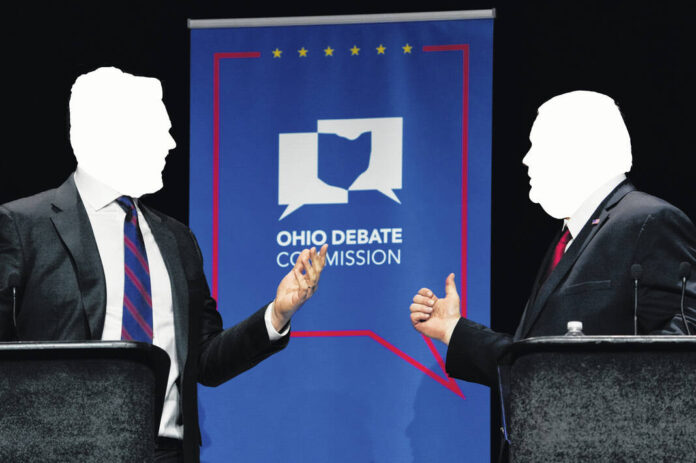LIMA — From views on civil rights to gun control to voting rights, debates have ushered in elections for decades. Political debates between two parties aid Americans in their decisions on election day. Candidates discuss important topics and their views on the solution.
Recently candidates in Ohio have declined invitations to debates. Gov. Mike DeWine and Senate candidate JD Vance, both Republicans, have not accepted invitations from the Ohio Debate Commission.
The ODC was created in 2018 to create a platform for televised nonpartisan debates for Ohio voters. Republicans aren’t so sure they were truly nonpartisan, though.
May’s primary debates
In the primary election, the ODC held a debate for the Republican and Democratic candidates to advocate for their stances. One debate hosted the six Republican candidates running in the primary election for Senate. The other two debates hosted Democratic candidates running in the primary election for governor and Senate.
Democratic Senate candidate Tim Ryan, Democratic candidate Nan Whaley, and Republicans DeWine and Vance won their campaigns in the primary election and are now on the road to November’s general election.
Although their campaigns were a success, not everyone believed the debate was fair.
In March, the ODC debate was hosted by Karen Kasler, statehouse bureau chief from Ohio Public Radio/TV. Some candidates felt the debate focused too much on recent events in the political realm and not the issues at hand.
“Several complained to me the debate was a disservice to Republican primary voters who are legitimately trying to understand the issues and candidates,” said Ohio Republican Party Chairman Robert Paduchik. “First, the fact-checking that was done came across as an attempt to embarrass the candidates on stage as well as discredit the millions of Ohioans who still believe there are unanswered questions about the 2020 election.”
In January of 2021, Ohio’s Republican Secretary of State Frank LaRose announced that 2020 presidential election results in Ohio were 99.98% accurate, based on post-election audit results.
Governor candidates
Gov. DeWine is running against Whaley, the former mayor of Dayton. DeWine has not accepted the debate invitation, nor did he accept it during the primary.
“Throughout the fall, DeWine and his opponent will have ample opportunity to outline their very different records and visions for Ohio,” according to DeWine’s campaign. “This includes the Ohio Association of Regional Council Forum, the Vote for Ohio Kids Forum on Oct. 6, as well as multiple Ohio newspaper endorsement screenings that have long served as de facto debates. Transparency and accessibility to leadership matters, which is why DeWine has held more statewide television addresses and press conferences than any governor in Ohio history.”
Whaley has agreed to debate DeWine.
“We owe it to Ohioans to debate the issues in a format where Ohioans can hear an open exchange of ideas,” Whaley said. “DeWine and I disagree on many things — on keeping our communities safe from gun violence and that government should stay out of a woman’s private health care decisions to name a few — but I at least thought he believed in debates that are a core tenet of democracy. I am ready to debate DeWine, and I hope that he changes his mind and will join me.”
Senate candidates
Vance participated in the ODC debate before the primary election in May. Vance has not accepted the invitation to return before the general election.
Members of Vance’s campaign said the debate was structured in a partisan way in favor of the Democratic Party. They said Vance does believe debates were a huge part of his success in the primary election for the Senate.
Ryan, who currently serves in the U.S. House of Representatives, has accepted the ODC’s invitation to a debate.
“We welcome the opportunity for Ohioans to hear from both candidates about their priorities and how they will work to address the biggest challenges facing Ohioans,” according to Ryan’s campaign.
Although the two Senate candidates may not face each other at the ODC, both have agreed to debate in the WLWT News 5 debate. That date has yet to be determined.
ODC’s future
The unwillingness to debate at ODC events is an early test for the fledgling organization.
“It is still a new organization,” said Dave Luketic, director of government affairs for Root Insurance and a political insider. “It would be helpful to have some Republicans and bipartisans in their group. They could put together a more meaningful forum for voters.”
Dan Moulthrop, the board president of the ODC, said polling shows Ohioans want the debates.
”A recent poll indicates that 84% of Ohioans would like to see gubernatorial and Senate candidates debate,” Moulthrop said. “We were established in 2018 to provide that service for Ohioans and candidates. We remain ready to do that.
“We’re seeing this trend across the country. Candidates seem to be enthralled with consultants who are telling them that debates are not in their best interest. I think they are in everyone’s best interest. What is surprising to me too is candidates who haven’t accepted our invitations are actually really good debaters and would do well.”







